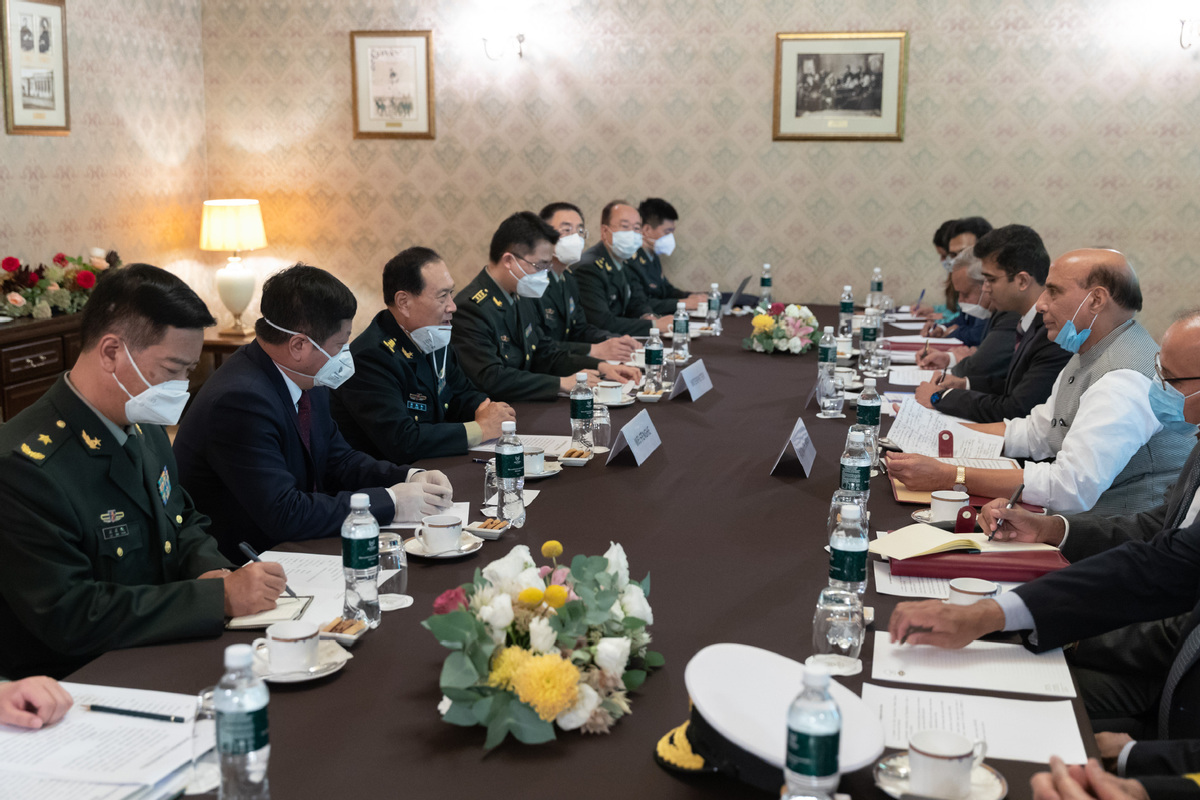


Chinese State Councilor and Defense Minister Wei Fenghe (third from left), and his Indian counterpart Rajnath Singh (second from right) hold a meeting in Moscow on Friday. BAI XUEQI/XINHUA
China's and India's defense ministers have met in Moscow in an effort to lower tensions along their border in the eastern Ladakh region and seek ways to enhance exchanges.
In the meeting on Friday, Chinese State Councilor and Defense Minister Wei Fenghe, urged India to strictly abide by the series of agreements reached between the two sides, to refrain from provocations on the current Line of Actual Control, to refrain from actions that may cause the situation to heat up, and to refrain from exaggerating and disseminating negative information.
"The Chinese military is fully determined, capable and confident of safeguarding national sovereignty and territorial integrity," Wei said on the sidelines of the Shanghai Cooperation Organization defense ministers' meeting in Moscow. The organization comprises China, India, Pakistan, Russia, Kazakhstan, Kyrgyzstan, Tajikistan and Uzbekistan.
It was the first and highest level of face-to-face talks between the two after recent border clashes. Foreign ministers and other officials of the two countries have been speaking over the phone since the standoff started in May.
Wei said the cause and truth of the current tension on the border are very clear, with the responsibility lying entirely with India.
"China would not give up an inch of its territory," he said.
In a statement issued by the Indian Defense Ministry, Rajnath Singh said "the current situation should be handled responsibly, and neither side should take any further action that could either complicate the situation or escalate matters in the border areas".
Solution through dialogue
China has sought for a dialogue and political solution to the border tensions with India, and criticized interference by officials of the United States.
Ji Rong, spokeswoman for China's embassy in New Delhi, responded to remarks made last week by US deputy secretary of state Stephen Biegun, who blamed the dispute in the contested Galwan Valley region on Beijing's "outsized demands". He made the comment in talks during the US-India Strategic Partnership Forum.
Ji said:"China has always insisted on resolving territorial and maritime disputes with neighboring countries through consultations and negotiations on the basis of respecting historical facts, to maintain regional peace and stability.
"China and India have the ability to resolve their border disputes bilaterally. We don't accept countries outside the region pointing fingers, let alone meddling or making instigation, which will only endanger the regional peace and stability."
Russia, responsible for chairing this year's Shanghai Cooperation Organization meetings, may play a key role in de-escalation by offering a platform for China and India to negotiate the dispute, experts said.
Danil Bochkov, an expert at the Russian International Affairs Council, said Russia values India and China as important diplomatic partners, and Russia and China share a common vision of global order.

 Award-winning photos show poverty reduction achievements in NE China's Jilin province
Award-winning photos show poverty reduction achievements in NE China's Jilin province People dance to greet advent of New Year in Ameiqituo Town, Guizhou
People dance to greet advent of New Year in Ameiqituo Town, Guizhou Fire brigade in Shanghai holds group wedding
Fire brigade in Shanghai holds group wedding Tourists enjoy ice sculptures in Datan Town, north China
Tourists enjoy ice sculptures in Datan Town, north China Sunset scenery of Dayan Pagoda in Xi'an
Sunset scenery of Dayan Pagoda in Xi'an Tourists have fun at scenic spot in Nanlong Town, NW China
Tourists have fun at scenic spot in Nanlong Town, NW China Harbin attracts tourists by making best use of ice in winter
Harbin attracts tourists by making best use of ice in winter In pics: FIS Alpine Ski Women's World Cup Slalom
In pics: FIS Alpine Ski Women's World Cup Slalom Black-necked cranes rest at reservoir in Lhunzhub County, Lhasa
Black-necked cranes rest at reservoir in Lhunzhub County, Lhasa China's FAST telescope will be available to foreign scientists in April
China's FAST telescope will be available to foreign scientists in April